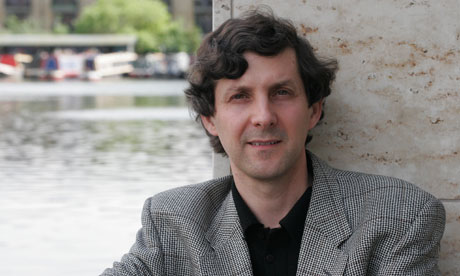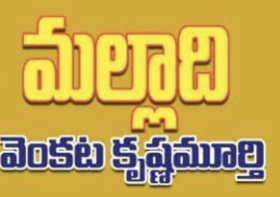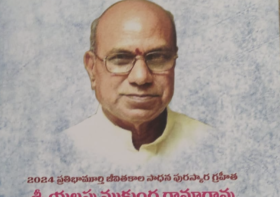Interview with Guy Deutscher

(Guy Deutscher is a popular linguist, now working at the University of Manchester. He has written several books and articles on language evolution for both linguists and general public. “Through the language glass” and “The unfolding of language” are two of his published books. Some of his articles can be accessed from his homepage here. Here is a small email interview we did with him, where he speaks not only about language, its evolution, handling a possible extinction etc., but also about Telugu, reasons for its present situation and suggests on how to improve the scenario. We thank Guy Deutscher for his co-operation and insightful comments. – pustakam.net )
Of course it is possible – after all, languages (as opposed to human beings) don’t HAVE to die. If their speakers have enough motivation to continue speaking the language, rather than switching completely to one of the dominant languages, then it won’t die. So it’s really a question of making people see the importance and value of their language. The problem, of course, is that it often it is extremely difficult to make people see that. Or – which is a particular tragedy – they do see eventually it, but only when it’s too late: when the last native speaker has died, suddenly the generation of the grandchildren remembers all the rich culture and traditions that were embodied in the language, and want to relearn it – but then it’s not so easy any more. In other words, the challenge is to make people see the value of the language not just in retrospect, but when it’s still widely spoken.
Yes, this is exactly as I mentioned before. The greatest enemy is indifference. Maybe one thing that could help is to try to paint to people in vivid terms what it would be like if the last native speaker of Telugu were to die. Write a short story: pretend that the year is 2010, and the last native speaker has just died, and how suddenly younger people are trying to discover all the cultural richness that was there, and is NOW TAKEN FOR GRANTED – the idioms, the folk-tales, the special ways of saying things, the jokes, everything – and there’s no one any longer to find out from. And how these younger people are extremely angry with their parents generation for having let the language go in this way. That may shake people from their indifference.
Any attempts towards one common universal language has never worked out. Your comments?
Well, there have in different periods in history been languages used as lingua franca. But they were usually regional rather than really universal.
You quoted examples from many languages in your books to explain some nuances. Do you know all or most of them? How well should one master the languages to study them?
Unfortunately, I don’t know all the languages I quoted. When you do linguistics, since you can’t ‘properly’ learn dozens or hundreds of languages, you have to learn about the structure and properties of languages without being able to speak them. So you end up knowing quite a lot about various languages and how they work, but not enough to be able to speak them. Of course, you always need to know a few languages very well – the ones you specialize in. But it’s not possible to have that type of knowledge across the board.
What are your favourite languages? How do you get to learn and practise extinct languages?
Your writings are fully comprehensible and delightful to read even for people without a trained linguistic background. How did you achieve this simplicity in writing? Were there any writers who inspired you in this aspect? Any suggestions to budding non-fiction writers on the same?
To understand more on the topic of language evolution and acquisition, where would you suggest for beginners with non-linguistic background to start with?
I find so little reference to Indian languages (The languages spoken in India, the country, I mean…not the Native American Indian Languages) in your articles. I did not find much information in the bibliography either (in “Through the language glass”). Is there very little work done in studying them?
Can you point to any specific references about studies in Indian languages? I tried but could not find much.
Some Useful links:
1) Wikipedia page
2) An Interview from American Scientist.
3) A review of “Through the language glass“, published here in pustakam.net
4) A review of “The unfolding of language“, published here in pustakam.net




Swathy
Good one … informative.
Suresh Kolichala
Wow! An interesting interview with a popular linguist!
Guy Deutscher apparently doesn’t know much about the enormous amount of research done on Indian languages in the past 250 years. In fact, the birth of historical linguistics was intimately tied to the discovery of how closely some of the Indian languages were related to the European languages. The famous speech delivered in Calcutta (now Kolkata) on February 2, 1786 by Sir William Jones, father of historical linguistics, is generally regarded as the beginning of the new field of historical linguistics. The following is the oft quoted excerpt from that speech:
Of course, while Sanskrit and other Indo-European languages of India attracted a lot of attention and devotion, other linguistic families of the Indian subcontinent received very little attention. We are fortunate that towering giants like Emeneau, Burrow and Krishnamurti devoted their lives to the exploration of Dravidian languages. Unfortunately, Munda, Tibeto-Burmese and other non-literary languages didn’t have any Emeneaus and Krishnamurtis, and some of these languages are disappearing fast.
Furthermore, it must be noted that much of the quality research on Indian languages was done by scholars of non-Indian origin. A sad reminder on how India has been neglecting studies in Humanities!
విజయవర్థన్
బాగుందండి. Thank you for posting it.